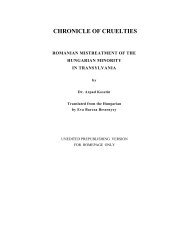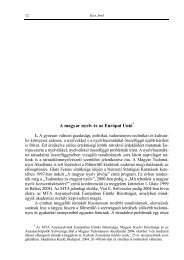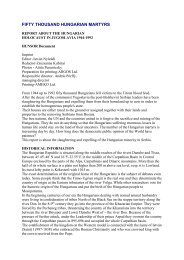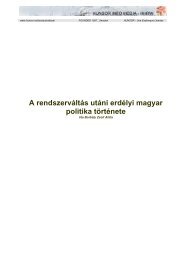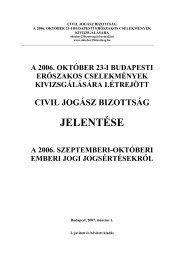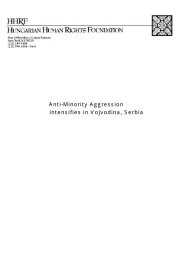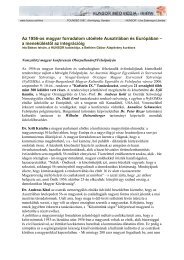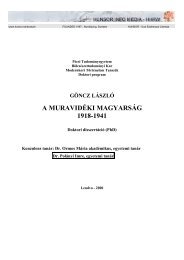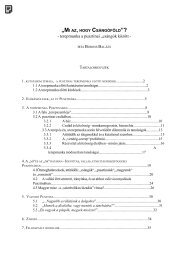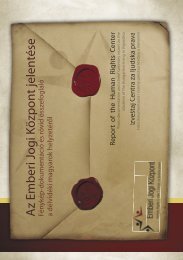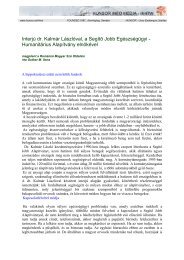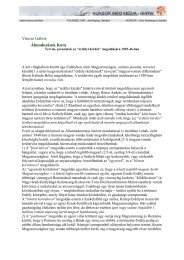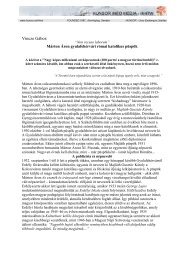7917 year old Karoly and 8 year old Gyula. They lived on a rented farm not far away from theBogdany farm in Hatarjaras. They had been living there for a long time and had a very goodrelationship with the owner, Mr. Cseszak. Cseszak, a clerk. He took up this post after the arrivalof the Hungarians. He lived on Zoldfas Street, near the entrance to the market, he was divorcedand lived with his son. He was considered to be a very good man in Becse.When my father, Jozsef Kovacs, was drafted, he hired a couple to help my mother cutthe hay. It was September 18th, at eight o'clock in the evening, and they had just gone to bed.My mother and her sons were frightened when someone began knocking on the door. Theythought that the couple living in the stable wanted to break into the house. My mother picked upher smallest son who was still sleeping and carried him with her. The older boy went ahead ofher through the next room. The boy jumped out of the window, but came back immediately andshouted:"Mum, there are a lot of people here." At that precise moment he was shot through theheart and died at once. My mother was shot at five times, three of the shots hit the boy in herarms. One bullet grazed her just beside the ear and the other next to her eye.Then the shooting stopped and the partisans came to my mother and asked her whereCseszak was. My mother answered that he was living in the town."We're looking for him", they told her. My mother said that we were living here now.The wagon in the yard had a small registration plate on it, with my father's name on it. TheSerbian partisans numbered a hundred or more, a lot of guns with them. According to mymother, all of them had fine, smooth hands. They were not peasants or workers but clerks andother white collar workers, young and middle-aged. There was a Hungarian woman among themwho asked my mother,"Do you know who we are?" My mother said that she did not. "We are the troops ofliberation. In two weeks the Russians will arrive and we will liberate Becse." "I don't care, Iwould just like one thing, please, bring my sons into the house", she said, as she looked at herdead sons lying on the ground."Not there", they were pointing at the house from which my mother and her sons hadcome."Take them in there then", my mother said, pointing to the summer kitchen. They took thedead bodies there.Meanwhile they went into the house and took everything we had away with them. The curtainswere torn away, clothes and bedding were wrapped in other bedding, so they could be takenaway more easily. Some days later one of these packs was found80in the nearby corn field.The only dress left for my mother was the one she wore and she had to borrow one from hermother, so that she could go to the funeral. The sons' best clothes were at my father'sgrandparents' in Becse, so they were buried in the clothes they had been wearing when they weremurdered. The partisans were there for a while and told my mother that she shouldn't go into thehouse before morning. My mother did not notice that she had been robbed in the meanwhile.
Then the partisans set off through the corn field towards another farm, where Cseszak lived.There were three Cseszak farms in the countryside and ours was the first the partisans visited.That evening they broke into another Cseszak farm and there they castrated another Cseszak whodied on the spot.They took someone with them as a hostage and he told me all this (later he hid under theleafes of a big pumpkin in the corn field and managed to escape that way).The partisan who shot my brothers regretted it later saying, "Why did I kill them when Iknew their father and grandfather." Another partisan tried to comfort him by saying, "Don'tregret it, two Hungarians less!" The murderer lived some distance from our grandparents' house.Later we lived there too, in one of the houses on Marshal Tito Street. Later on he married aHungarian woman. Once, when he got drunk in the bar, he also showed some regret: "Everyonewho we killed deserved it except the two boys!" The bar owner told my father. I knew that hewas living near us, but I did not know him, because he worked at the court in Novi Sad and hespent little time in Becse. I knew his wife, she was always looking out of the window.Once, in the mid sixties when my sister and I went to the artesian well for some water. ASerbian man said that he was very much distressed. He asked us whose children we are and howold. My sister a university student then, spoke to him and I was still in secondary school. Hewas surprised at our ages and talked to us in a very quiet voice. He asked "Aren't you grown upyet?" He asked my sister to visit him at the Court in Novi Sad. He wanted to get a scholarship forher. We didn't visit him.Returning to the day of the massacre, September 18, 1944, my mother was left alone onthe farm. Later one of our neighbors came to see her and stayed with her until the next morning.The news of the tragedy had spread very quickly. Having heard the news, Cseszak came overearly in the morning. He cried and said again and again: "They were very good children."Cseszak left for Hungary, from the farm that morning and died there. His son81died in Becse a few years ago.My father was taken to Verbasz. September 18 he and another man were told to gohome. He had a bad feeling at once, why? His friend's house was blown up and his family diedthere. My father came from Verbasz to Becse by train. He heard on the train about the two boyswho had been murdered in Becse the previous night, they were children. As they talked about itmore, he started to recognize the place. He asked who they were and was told. They also saidthat the mother and father-in-law were in the next railway car, so he could go and ask them. Mygrandparents lived in Szenttamas and had gotten on the train there. My father went to them andthey gave the same news. When my father arrived in Becse, he went to purchase two coffinswhich he took to the farm. There was an air raid alarm during the funeral so the mourners had totake cover somewhere as quickly as they could, they ran in every direction. My mother couldn'tgo anywhere, she fainted and was left at the grave. Karoly and Gyula Kovacs are buried near thechurch in the Central Cemetery. If you stand opposite the church, it is on your right.<strong>This</strong> story was written by Terez Kovacs who lived in Hungary from 1986. I was born in1949.Please let me know about any events organized in the memory of the murdered innocentpeople. I would like to do something to help."
- Page 3 and 4:
Library of Congress Catalogue Card
- Page 5 and 6:
Mutilation of the hands or feet wit
- Page 7 and 8: they wanted to belong. On the annex
- Page 9 and 10: individuals, then shooting them by
- Page 11 and 12: the Russians and under their protec
- Page 13 and 14: 22PEOPLE OF BEZDAN1.On a May aftern
- Page 16 and 17: 26that those people all fell victim
- Page 18 and 19: ack a 13 year-old boy to the soccer
- Page 20 and 21: Russian officers cursed and told th
- Page 22 and 23: Jani was set free for he had been a
- Page 24 and 25: There were some people who, in spit
- Page 26 and 27: March 12, 1945. The relatives of th
- Page 28 and 29: Ferenc Csapo, 33 Mihaly Miovacs, 18
- Page 30 and 31: Having heard about the advance of t
- Page 32 and 33: "On November 3, I got up at five in
- Page 34 and 35: The vicar would come every night. H
- Page 36 and 37: hand. Raising it to his mouth, he d
- Page 38 and 39: "24th October, 1944. Yesterday was
- Page 40 and 41: "I have only one chance to be sacri
- Page 42 and 43: The data, which shows that on the s
- Page 44 and 45: all the captured Serbs, as neither
- Page 46 and 47: Before and during World War II, the
- Page 48 and 49: would order fire in an instant. Wit
- Page 50 and 51: Our house looked out over the main
- Page 52 and 53: He had just arrived home after thre
- Page 54 and 55: 28. Jozsef Pasztor, 34 56. Albert G
- Page 56 and 57: The OZNA officer, who exhumed a mas
- Page 60 and 61: 82FROM SZENTFULOP TO THE GAKOVA CAM
- Page 62 and 63: My mother died on January 4, 1946.
- Page 64 and 65: Jozsi, the leader of our committee
- Page 66 and 67: his own grave, then machine gunned
- Page 68 and 69: driving a wheelbarrow on the sidewa
- Page 70 and 71: "Now that's exactly what we needed
- Page 72 and 73: 15 Istvan Polyakovics, Zenta, 18861
- Page 74 and 75: idge was built (from several rows o
- Page 76 and 77: There is a common opinion among the
- Page 78 and 79: The Catholics of the village were o
- Page 80 and 81: and their supporters. On one occasi
- Page 82 and 83: "My younger brother, Bandi, was tak
- Page 84 and 85: two young instructors staying in he
- Page 86 and 87: In Tunderes (Vilova) there was no o
- Page 88 and 89: weeks spent starving, laying on str
- Page 90 and 91: 121PACSERAt Pacser sixteen Serbians
- Page 92 and 93: piece of land, there are three rows
- Page 94 and 95: "I understood that through the OZNA
- Page 96 and 97: took the priest under their protect
- Page 98 and 99: "We set off from Hadikliget on Octo
- Page 100 and 101: everyone to the front! The Party us
- Page 102 and 103: 137REPORT OF LOSSESIn addition to o
- Page 104 and 105: 141Source: Zlocini okupatora u Vojv
- Page 106 and 107: well as in words, that there had be
- Page 108 and 109:
The American military forces delive
- Page 110 and 111:
culpability or participation are th
- Page 112 and 113:
The accused did not make use of his
- Page 114 and 115:
the spirit of revenge among the Hun
- Page 116 and 117:
considered all the claims of Hungar
- Page 118 and 119:
The People's Court of Budapest just
- Page 120 and 121:
From then on all hell breaks loose.
- Page 122 and 123:
Recommended readingeRudolf Kiszlion



